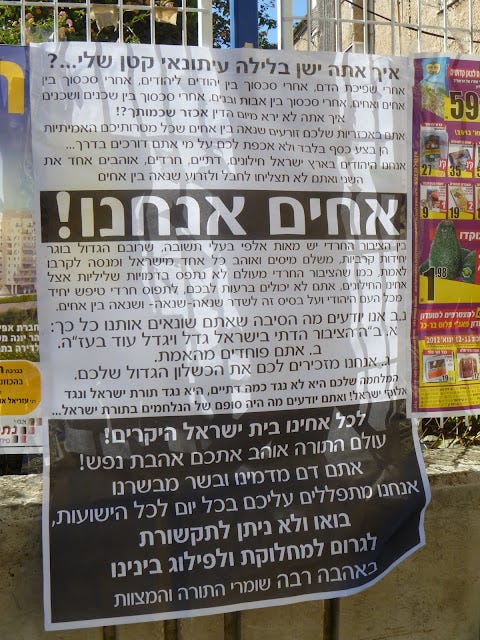"We Love You! And Pity You!" Plus, the Inaccuracies in Ami and elsewhere
Reader Dov Kaiser sent in this photo of a poster displayed in a Charedi street in Rechovot. He wonders whether it is really addressed to Chilonim, as it purports, or if it is to make Charedim feel better about themselves:

It's amazing how some parts of it are so helpful, and other parts so deeply offensive.
In other news, the Mayor of Bet Shemesh, Moshe Abutbol, stated in Ami magazine that the Orot school is "in the middle" of a charedi neighborhood. The same was stated by Yisrael Eichler in HaModia. This is a blatant lie. In fact, the school has a valley behind it, a new charedi neighborhood on one side, and a dati-leumi neighborhood on the other side as well as facing it.
This isn't the only inaccurate information that you'll find in Ami. See this very important post at Life In Israel, which shows that, contrary to the story that Ami magazine ran, significant elements of the Eidah HaCharedis did support the notorious rally in Mea She'arim.
Other false claims that I have seen lately include:
1) HaModia reported a claim that nobody has ever been forced to sit at the back of a Mehadrin bus. But I've seen it with my own eyes! I usually drive, but on one occasion where I had to use the bus, I witnessed a man in charedi attire barricade the front of the bus to prevent religious girls boarding (they could not board at the back, because it was too crowded). Countless people have witnessed such things. How can they report such a blatantly false claim?
2) Someone else claimed that "there hasn’t been any violence" in Bet Shemesh/ Ramat Bet Shemesh "except for by a few thugs a few months ago." I wish that were true, but it's not. There have been many, many incidents of violence against non-charedim over the last few years.
3) Another claim was that "There is absolutely no imposition of Mehadrin standards onto the general public." This is certainly incorrect with regard to Ramat Bet Shemesh. For example, the stores in the main shopping area have been intimidated into putting up signs demanding adherence to certain tzniyus standards, and into allowing mashgichim to deface the packaging of cosmetics that have pictures of women on them. And even a mainstream Anglo-charedi figure, Rav Elimelech Kornfeld (not to be confused with his brother in Har Nof; as we see throughout Tenach and history, people are not to be judged by the actions of their brother!), sought to prevent the opening of eating establishments with seating at the small shopping area near where I live. (In the end, the lawyers were brought in, and this particular effort failed.)


